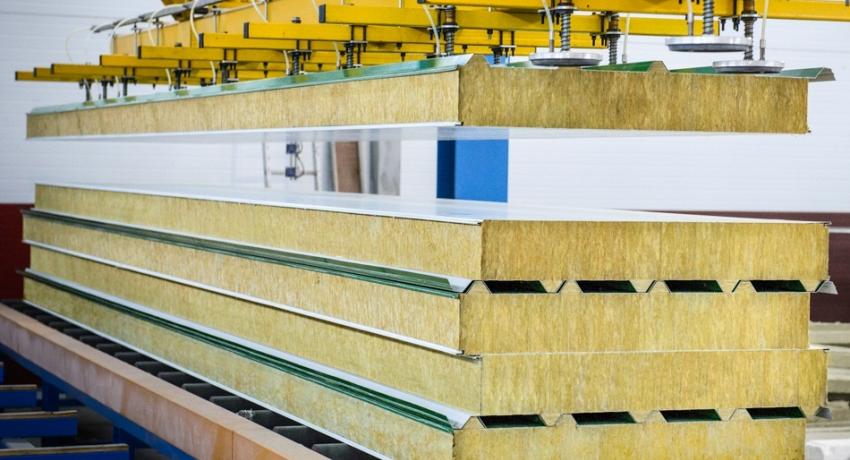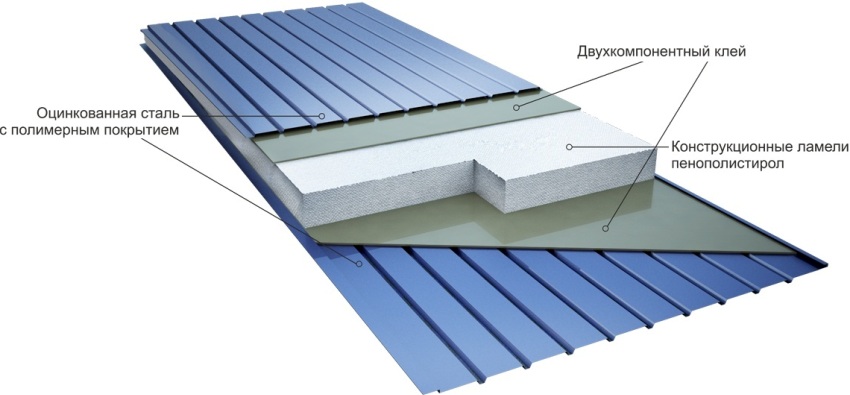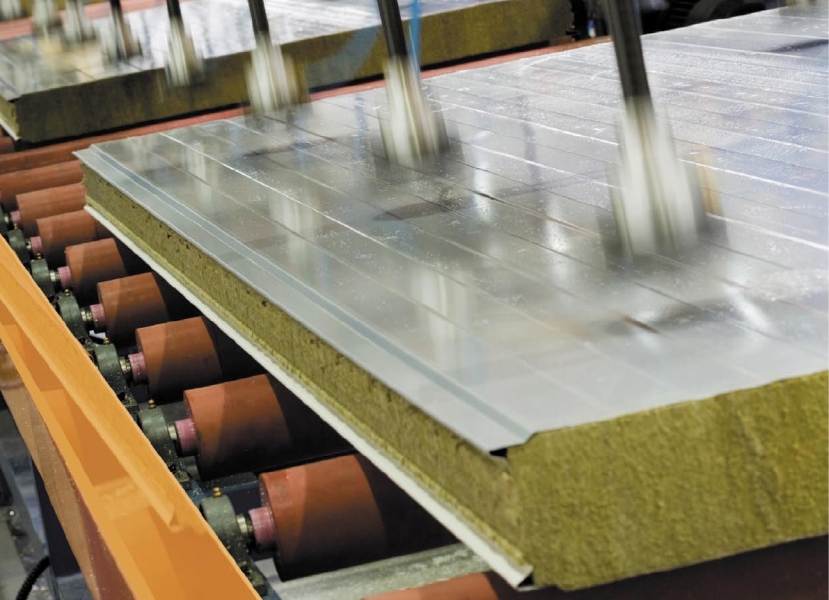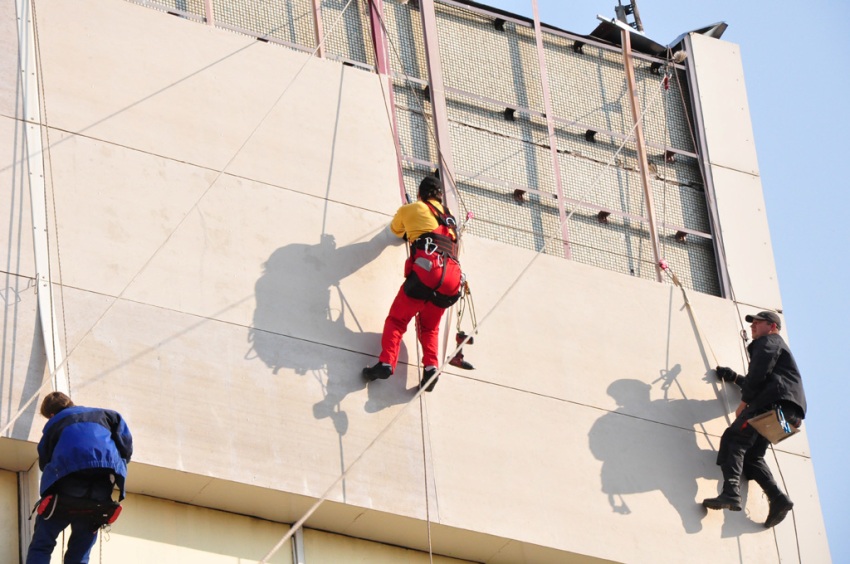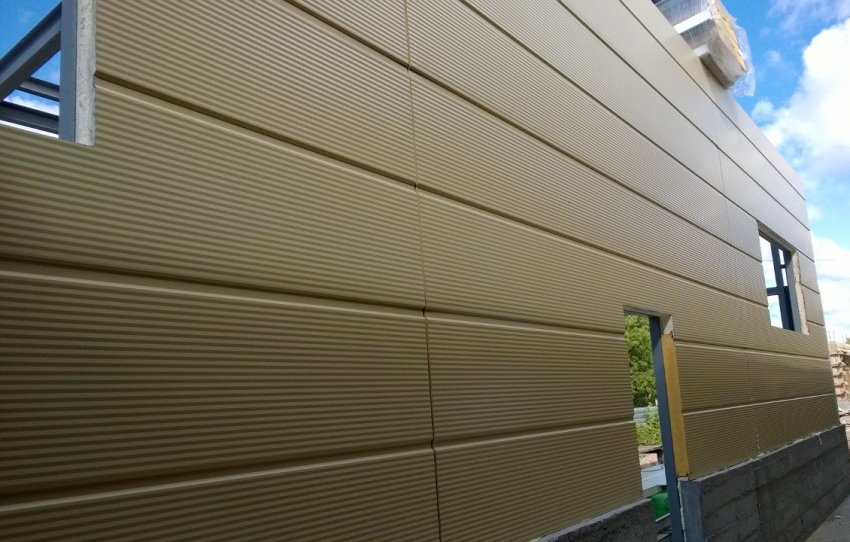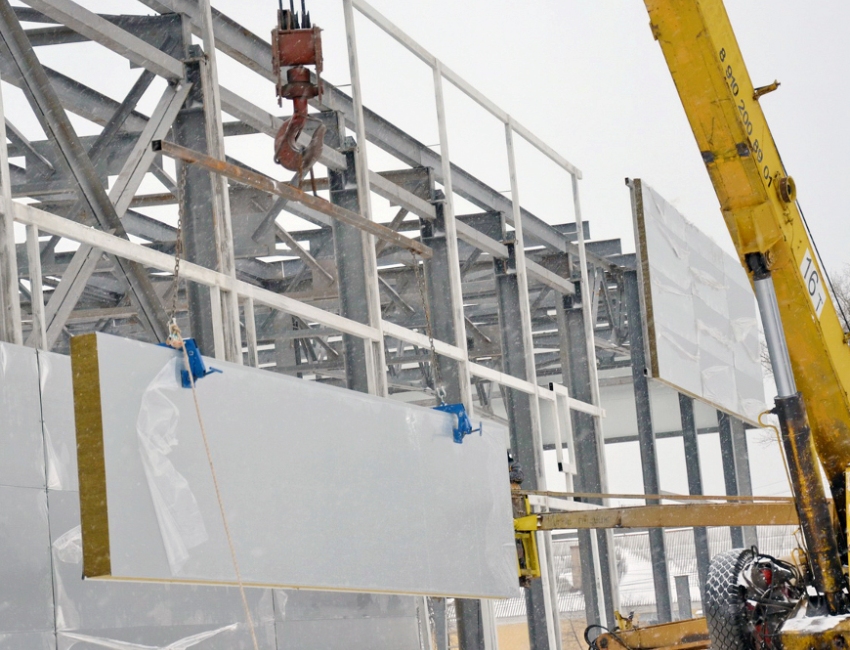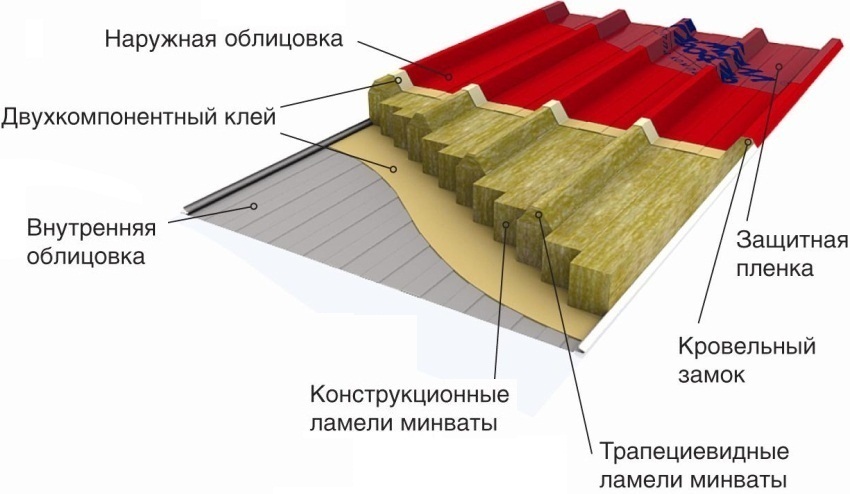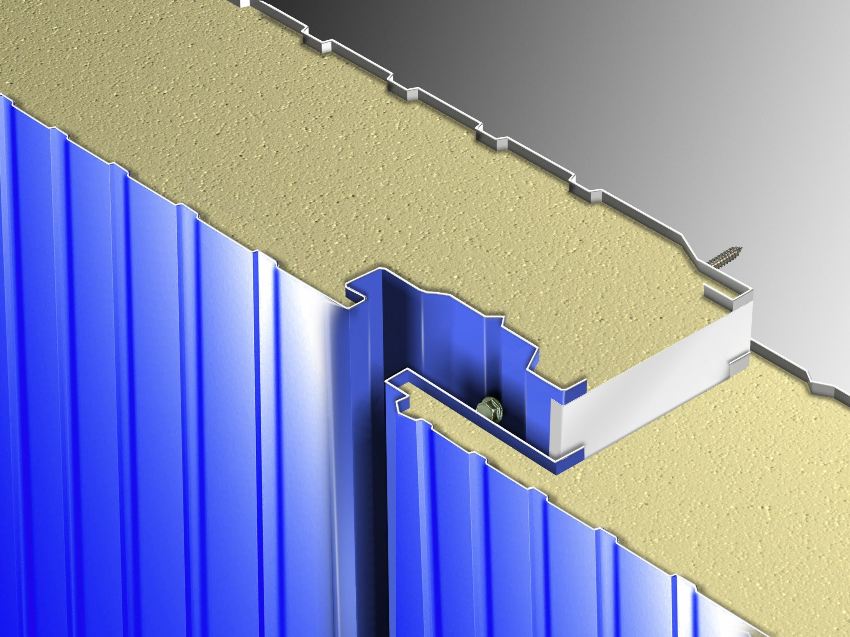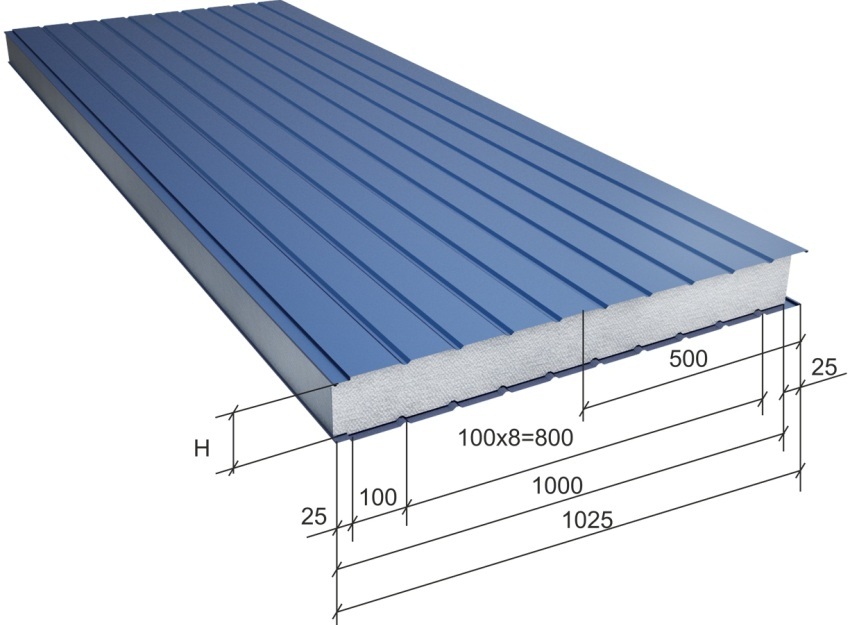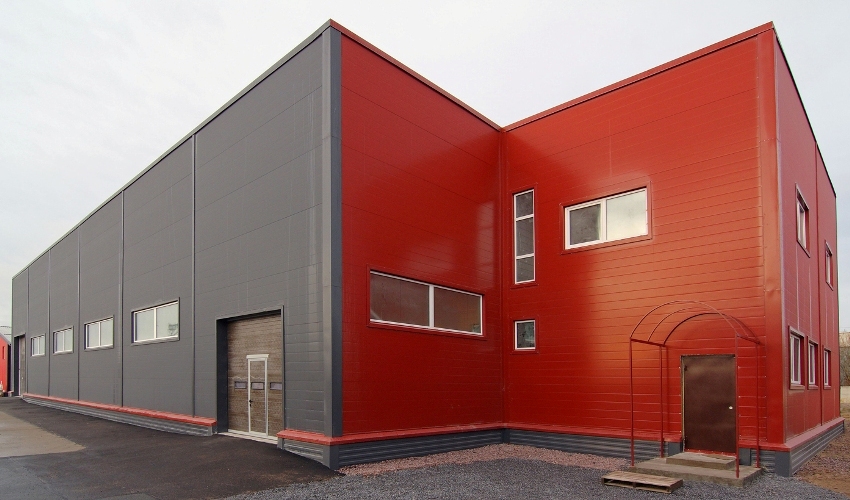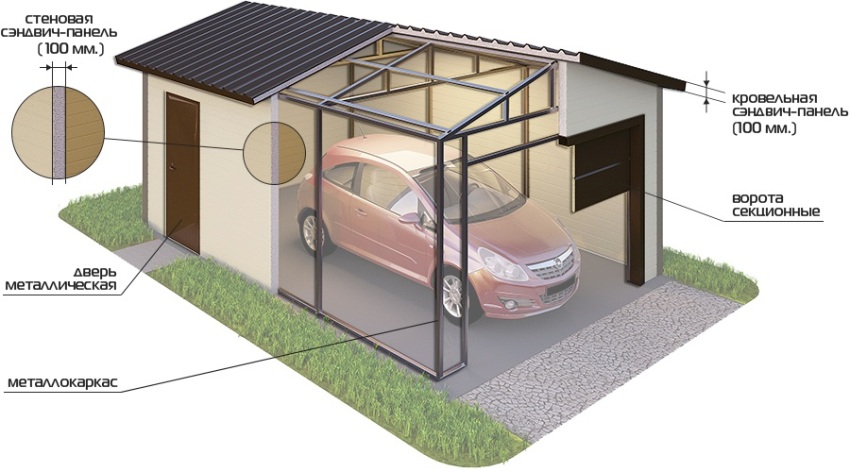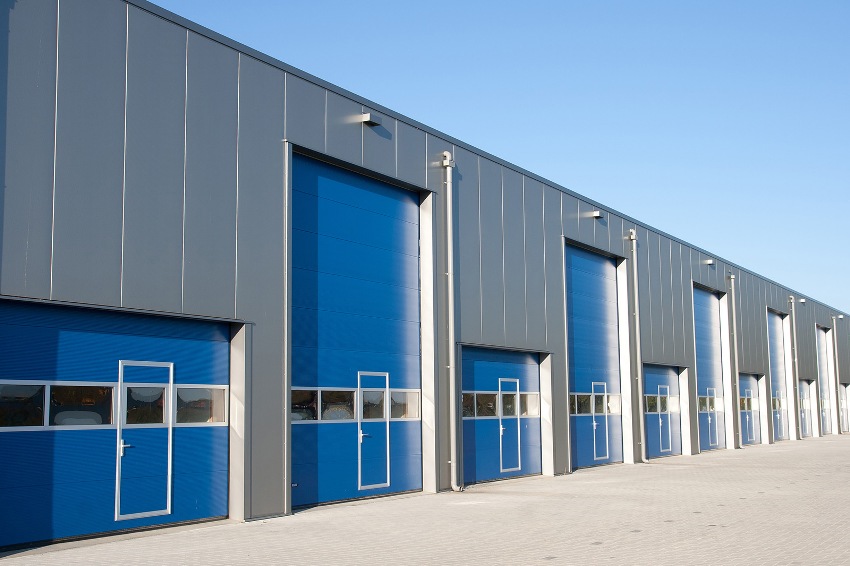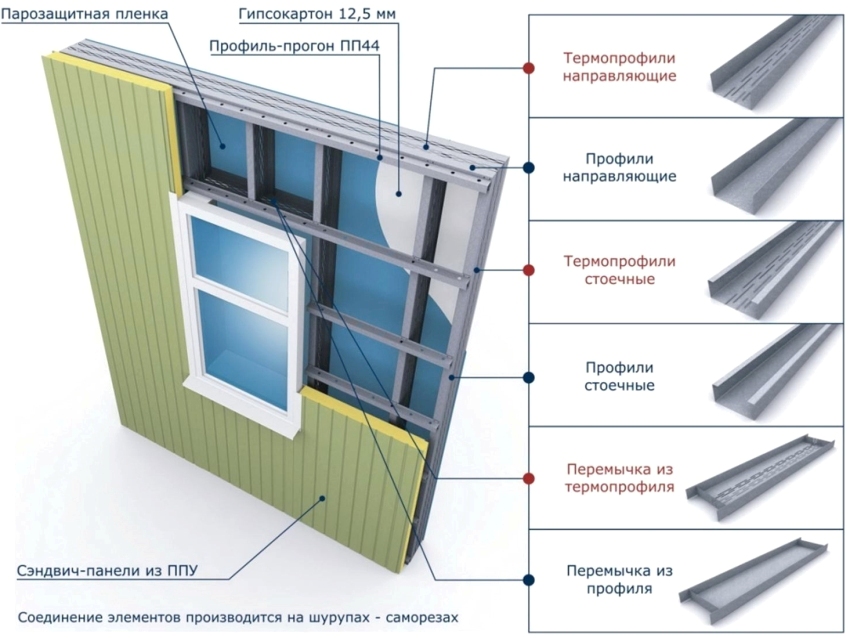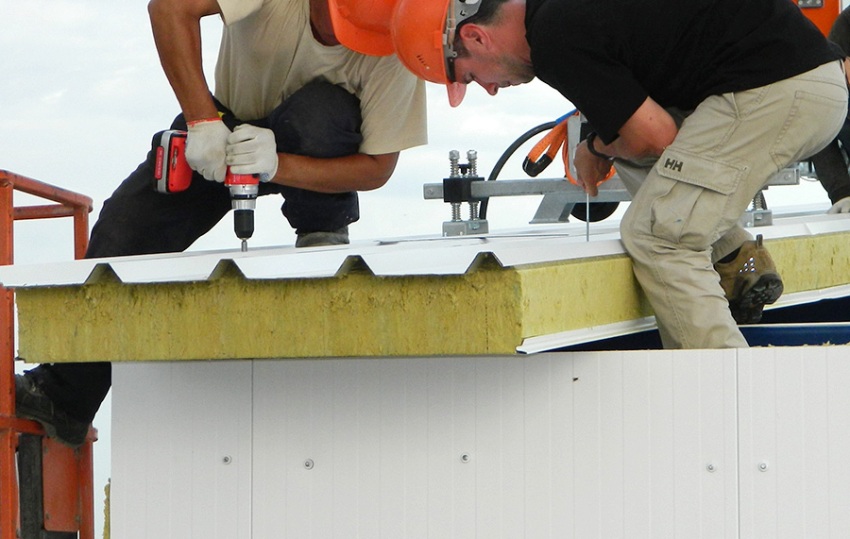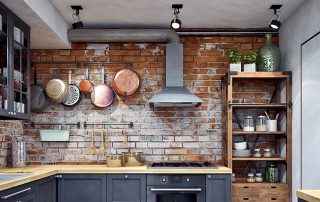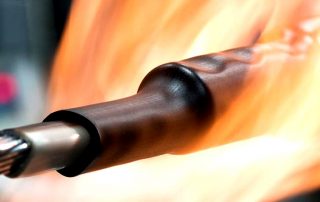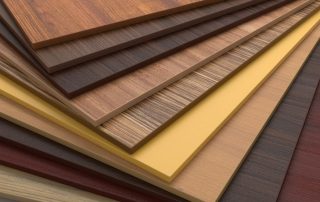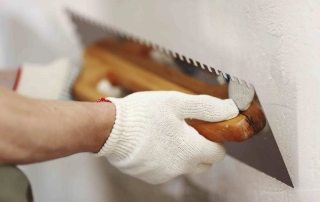The sandwich panel is a three-layer structure that is used in building construction. It consists of two outer layers and insulation between them. These products appeared on the construction market not so long ago, but have already managed to gain popularity among buyers. This article will discuss the main characteristics that sandwich panels have: sizes and prices, as well as other parameters.
Content [Hide]
Sandwich panel: what is it
The sandwiches used in the construction of houses are made up of three layers. The two outer layers are made of the same material, with the most popular being galvanized steel. This is due to the high technical characteristics of galvanizing, among which: excellent corrosion resistance and resistance to high temperatures. Sandwiches made from aluminum and oriented strand board (OSB) are also common.
The most common insulation materials used in the production of sandwich panels are expanded polystyrene (PPS), polyurethane foam (PPU) and mineral wool. Polyurethane foam products have high thermal insulation performance and resistance to moisture.
Note! In some cases, panels are made with the addition of a fourth layer, which is drywall. Adding the latter to the structure of the sandwich makes it possible to increase the fire resistance of the structure.
The main advantage of such slabs is that sandwich panel structures can be built even in difficult climatic conditions. Domestic companies, in the production of such building materials, are guided by the technologies used in the USA and Canada.
Operational area of sandwich panels
These building elements are practically devoid of disadvantages, which determines their high popularity. Consider what buildings are being built using sandwich slabs:
- residential buildings;
- athletic facilities;
- office and administrative buildings.
Such products are subdivided into 3 main types according to their purpose:
- for walls;
- for the roof;
- for windows.
In the first case, the installation of building elements is carried out on a metal frame. Wall slabs are used to organize the outer box of the house as well as the inner partitions. Roofing and window sandwiches are also used in the installation of various structures and differ from wall models in technical characteristics and cost.
The use of sandwich boards allows you to complete the project in a short time at a minimum cost. Due to the low weight of such panels, the need for a high-strength foundation is eliminated.
Sandwich panels are often used when organizing various kinds of fences, as well as for carrying out reconstruction work at various construction sites. Rigid slabs, which have a ribbed outer layer, are used to erect lightweight frame structures. Such structures include, for example, garages and kiosks.
Advantages and disadvantages of sandwich panels
When choosing a material for building a house, you must pay attention to all its characteristics. Let's consider the main advantages of using sandwich panels:
- high speed of construction, which allows you to implement the project in the shortest possible time;
- favorable cost;
- the possibility of organizing not only mechanical protection, but also thermal insulation;
- no need for additional insulation of the building;
- a small mass of slabs, which reduces the load on the foundation of the building. This item greatly simplifies the construction of a house from sandwich panels;
- for the installation of such plates, there is no need to use special construction equipment;
- facade panels are not only a material for the construction of a building, but also a decorative element, so there is no need to waste time on the exterior decoration of the building.
Helpful information! Sandwich panels are used not only as the main building material, but can also be used for cladding a building. In this case, they act as additional thermal insulation.
Like any other building product, they also have some disadvantages that you should pay attention to:
- a finished building made from such slabs cannot withstand significant mechanical loads;
- when decorating rooms, it is necessary to take into account the fact that overloading the sandwich plate can lead to its destruction.
Varieties of sandwich panels
Sandwich slabs consisting of several layers are subdivided into several varieties, depending on the purpose. As mentioned above, wall, roofing and window models of slabs are distinguished. The fixation of these products is made on special self-tapping screws, which differ in their length.
There are also PVC panels that are used for slopes when installing windows. The installation of these building elements allows the structure to be insulated. You can buy a sandwich panel for slopes in any specialized store, construction hypermarket, or order online. The price of a sandwich panel for a slope is on average 300–400 rubles.
Features of wall sandwich panels
These panels are used for cladding the walls of the house and for organizing internal partitions. With the help of them, supporting structures are also installed, since their technical characteristics allow the plates to be used for this purpose.
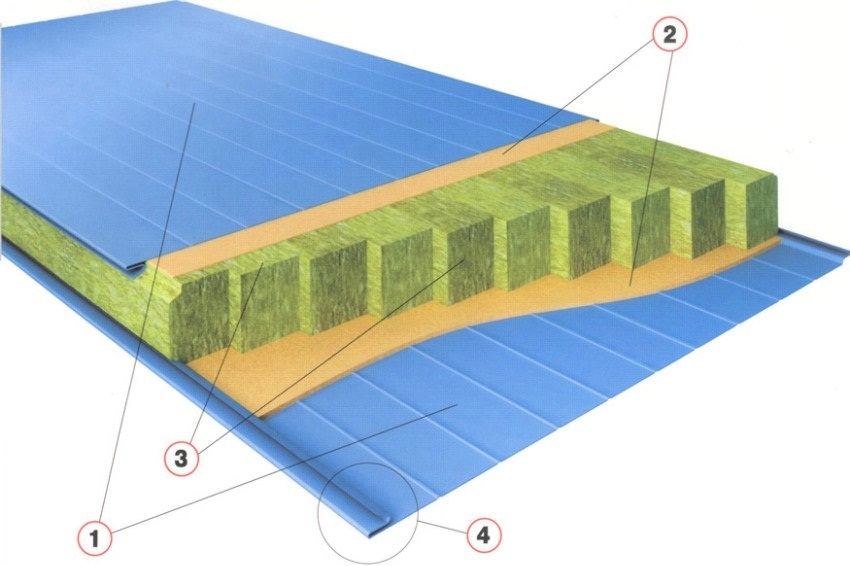
Wall sandwich panel construction: 1 - galvanized steel with a polymer coating, 2 - two-component polyurethane-based adhesive, 3 - structural mineral wool lamellas based on basalt fiber, 4 - labyrinth lock joint
To increase the stiffness and strength index, the wall modification is faced with steel sheets. And also such plates have a high coefficient of thermal insulation and are distinguished by fire resistance.
Roofing panels and their characteristics
The peculiarity of using roofing boards affects their technical characteristics. Since roofing models are used for roof installation, they have high moisture-insulating characteristics. This property is very important, since a good roof must protect the interior of the house from precipitation.
In addition to enhanced waterproofing properties, roofing models also differ in thermal insulation qualities. Sandwich panels used for roofing trap warm air that rushes upward inside the house. This keeps heat losses to a minimum. The fixing of the roofing boards is done using self-tapping screws to the wooden blocks.
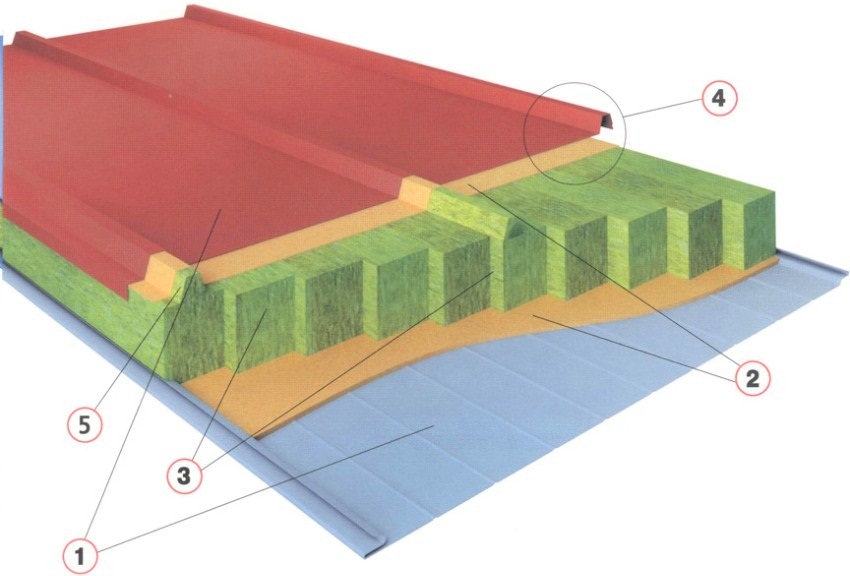
Roof sandwich panel construction: 1 - galvanized steel with polymer coating, 2 - two-component polyurethane-based adhesive, 3 - structural mineral wool lamellas based on basalt fiber, 4 - labyrinth lock joint, 5 - trapezoidal mineral wool lamellae based on basalt fiber
It is also worth saying that such products are noise insulating. They are equipped with special fixing elements that allow quick installation and enhance protection against atmospheric precipitation. The service life of such products is quite long. Another advantage of using roofing sandwich panels is that they do not deform over time and do not lose their properties.
Corner sandwich panels: sizes and prices
Corner sandwich elements are used for design, as well as protection of the corners of the building from the effects of low temperatures. Very often, residents of houses are faced with the fact that poorly insulated corners of a building freeze through in the winter season. Such slabs can take one of two forms:
- rectangular;
- rounded.
The angle slab can have a thickness of 60 to 250 mm, and the length and width of the sandwich panel are in the size range of 0.4-3 and 1-1.2 m, respectively.

Various angular variations sandwich panels
The cost of corner panels with basalt fiber insulation ranges from 1500–2500 rubles. for 1 m².
More about sandwich plate construction
The outer facing layer of the sandwich panel can be faced with various materials. They perform not only a protective, but also a decorative function. Consider what materials are used for facing sandwich slabs:
- ceramic concrete;
- ceramic tiles;
- plasterboard sheet;
- OSB;
- MDF;
- Chipboard;
- Fiberboard;
- aluminum;
- stainless steel;
- Cink Steel.
Note! The metal cladding at the production stage is equipped with a protective coating - zinc spraying or a polymer layer. This is necessary to enhance the anti-corrosion properties and the stiffness of the slab.
Let's consider the composition of the external cladding in more detail:
- steel sheet that has a thickness of up to 0.5 mm;
- zinc layer or decorative layer of polymer material (thickness up to 0.25 mm);
- varnish or paint.
Related article:
Sandwich chimneys made of stainless steel: prices for pipes and accessories
Chimney production. Chimney sizes. Recommendations for selection and installation. Where to buy chimney pipes.
The heat insulator located between the two outer layers can consist of the following materials:
- mineral wool (basalt, stone or glass wool);
- Styrofoam;
- expanded polystyrene;
- polyisocyanurate foam.
Characteristics of thermal insulation materials
Let's consider the main heat insulators used in the construction of a sandwich plate and their properties:
Mineral wool is a very common thermal insulation material, which is used not only in sandwich panels, but also in other structures. This building material is regulated by GOST 32603–2012. As a rule, mineral wool is used in the construction of structures with high fire safety requirements.
This material also has some disadvantages. For example, mineral wool absorbs moisture well and loses its beneficial qualities over time. And also the disadvantages of mineral wool include its weight, which is higher than that of other heat insulators.
Expanded polystyrene... PPP is regulated by GOST 15588–2014. Such material is characterized by good environmental friendliness and is safe for human health. PPS has good moisture resistance and is also resistant to aggressive chemicals. The price of a sandwich panel with EPS filler is the lowest (in comparison with other products).
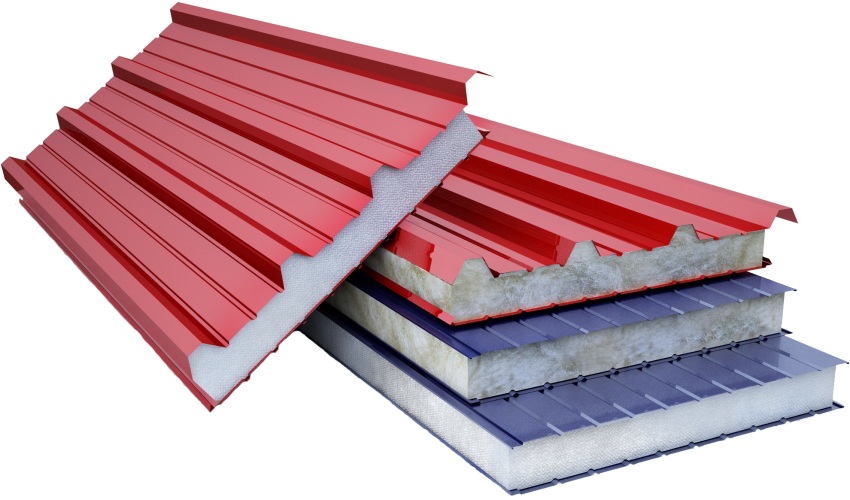
Expanded polystyrene, mineral wool, polyurethane and other materials can be used as a heat-insulating filler for sandwich plates.
Of the disadvantages of expanded polystyrene, only a weak fire resistance can be distinguished. The low weight of the PPS contributes to the quick installation of industrial and commercial structures.
Polyurethane foam... is a heater that has a fine-mesh structure. The main advantage of PPU is its low thermal conductivity (lower than that of mineral wool and PPP). It is regulated by the relevant state standard 23486-79.
The main disadvantage of polyurethane foam is its low fire resistance. And also the PU foam deteriorates when exposed to ultraviolet rays. Sandwich plates, inside which PPU is located, are often used to organize refrigeration chambers.
Polyisocyanurate foam... This material is an improved analogue of polyurethane foam. It differs in that it has a higher resistance to open fire and exposure to direct ultraviolet rays. Design and survey work is regulated by GOST 23486–79.
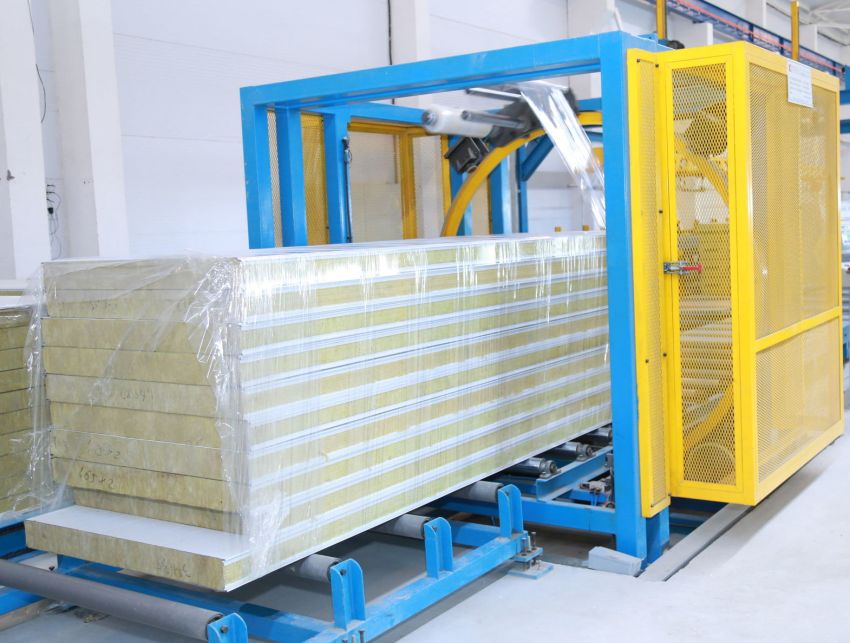
Depending on the type of internal filler, the boards can be used for the construction of both cold and warm rooms.
Helpful information! The thermal conductivity coefficient of polyisocyanurate foam is lower than that of all other thermal insulation materials.
Due to its qualities, PIR is used in the organization of freezers and swimming pools. Resistance to active chemicals allows the use of this material in the construction of warehouses for harmful chemical compounds.
Wall sandwich panels: panel sizes and prices
Wall sandwich panels are used for the construction of walls and partitions. The ratio of the sizes of sandwich panels to prices varies, depending on what materials were used in the production of the board. For example, to perform the same thermal insulation of a house, it is necessary to use polyurethane foam boards, the thickness of which is 50 mm, or products containing a layer of 100 mm mineral wool inside.
For the installation of industrial structures, products are used whose length and width are 7.5–8 and 1.15 m, respectively. The use of long panels makes it easier and faster to install the building.
The length of a standard sheet is within 3-8 m, width - 1.2 m, thickness - 40-320 mm.
Of the disadvantages of sandwich panels for walls, one can note a weak resistance to mechanical stress. To improve the strength indicators, the sheets are coated with special protective compounds. The variety of assortment allows you to easily choose and buy a sandwich panel. The price of different types of wall panels is shown in the table below (for 1 m²):
| Wall panel type | Filler | Panel price, depending on thickness, rubles / m² | ||||
| Panel thickness, mm | ||||||
| 40 | 60 | 80 | 100 | 120 | ||
| Steel plate with protective film | PPU | 1120-1190 | 1340–1420 | 1510–1595 | 1725–1800 | 1930–2020 |
| FEAST | 1175–1260 | 1395–1480 | 1565–1650 | 1780–1870 | 2050–2095 | |
| PPP | 1000–1200 | 1150–1350 | 1175–1390 | 1200–1400 | 1250–1450 | |
| Basalt wool | 1180 | 1200 | 1280 | 1330 | 1380 | |
| Stainless steel plate | PPU | 1680–3795 | 2100–4010 | 2335–4195 | 2565–4400 | 2680–4610 |
| FEAST | 1870–3850 | 2080–4075 | 2265–4255 | 2480–4470 | 2700–4700 | |
| PPP | – | 2630–3880 | 2640–3910 | 2690–4250 | 2740–3990 | |
| Basalt wool | – | 2160–3970 | 2230–4040 | 2290–4110 | 2360–4180 | |
Prices and sizes of roof sandwich panels
The popularity of these slabs during the installation of the roof is due to the fact that they are made together with a heater. Thus, the construction time of the roof structure is reduced by several times. The most common material from which such panels are made is galvanized steel with a special protective coating. In second place is stainless steel. The sizes of roofing sandwich panels are in the range: length 8-16 m, width 1000 mm and thickness 40-160 mm.
Many companies produce products of non-standard sizes, so if necessary, you can place an individual order. The cost of roofing panels differs depending on the thickness and type of insulation, as well as the material of manufacture. The table below shows the approximate prices for 1 m² of various roofing boards:
| Roof panel type | Filler | Panel price, depending on thickness, rubles / m² | ||||
| Panel thickness, mm | ||||||
| 40 | 60 | 80 | 100 | 120 | ||
| Steel plate with protective film | PPU | 1315–1390 | 1515–1600 | 1650–1750 | 1880–1960 | 2390–2480 |
| FEAST | 1330–1410 | 1550–1630 | 1710–1790 | 1900–2000 | 2150–2250 | |
| PPP | – | 1200 | 1250 | 1300 | 1350 | |
| Basalt wool | – | 1300 | 1370 | 1430 | 1480 | |
| Stainless steel plate | PPP | – | 2950–4410 | 3000–4440 | 3050–4550 | 3100–4600 |
| Basalt wool | – | 2380–4550 | 2440–4600 | 2510–4670 | 2580–4750 | |
You can buy a sandwich panel of any type in a specialized store or a construction hypermarket. And you can also place an order for the necessary building material via the Internet.
Note! An experienced team of craftsmen can assemble up to 500 m² of roof sandwich panels within one working day.
Turnkey houses from sandwich panels: prices
The construction of frame houses is gaining popularity. If necessary, you can order a turnkey house. Let's consider what advantages such residential buildings have:
- high speed of construction;
- good thermal insulation. The materials from which the sandwich plates are made retains heat inside the building and does not allow cold to pass inside;
- fire resistance;
- soundproofing;
- environmental friendliness;
- durability (the service life of such a house can reach 80 years).
Frame houses are also called Canadian, as they are built using the same technologies as in Canada. The foundation for such a house is made on screw piles. Let's consider the main advantages of such a foundation:
- high speed of execution (no more than 2 days);
- long service life (up to 100 years);
- the ability to mount on any type of soil;
- the possibility of installation at any time of the year;
- high environmental performance;
- savings (up to 50%).
A frame house made of sandwich panels with an area of 64 m² will cost about 820 thousand rubles, and a house of 130 m² - 1.2 million rubles. The table below shows the approximate prices for the installation of sandwich panels for 1 m² of the frame and roof (excluding materials), as well as the cost of organizing the foundation:
| Type of work | Price, RUB / m² |
| Foundation organization | from 800 |
| Building a box at home | 320–700 |
| Roof installation | 370–750 |
To select the appropriate option, it is recommended to study on the Internet photos of houses made of sandwich panels. Prices for such cottages are also listed on the websites of construction companies.
Sandwich panel garages: prices and design features
For the installation of the garage frame structure, special sandwich panels are used - rigid ribbed ones. From a financial point of view, the organization of such a garage is more profitable than the construction of a building made of brick or concrete. A hangar for household or industrial purposes can also be made from such panels. The price of a hangar made of sandwich panels depends on the dimensions of the building.
Consider the main structural elements that are used when installing a garage structure:
- frame made of profile square pipes with a section of 60x60 mm;
- sandwich panels.
For such a garage structure, it is not necessary to install a capital foundation, since the sandwich elements are lightweight. It is enough to organize the grillage tape. The recommended width of such a tape is 20 cm.
Note! The cost of organizing a turnkey garage ranges from 200 thousand to 1.5 million rubles. The turnkey garage execution time is 3-4 days.
Garage structure made of ribbed sandwich panels is compact and versatile. If necessary, the structure can be disassembled and moved to another place, which is very convenient.
On the Internet, you can study the opinion of developers about houses from sandwich panels. Reviews of garages from this material are also present on construction forums.
Installation of sandwich panels: instruction
Installation of sandwich panels is a serious event that requires professional construction skills and knowledge. Therefore, the best option in such a situation is to use the services of qualified specialists. However, if necessary, you can install the sandwich structure yourself.
Before starting installation, prepare the following tools and materials:
- sandwich plates;
- screwdriver and drill;
- metal corner or U-shaped profile;
- level;
- fine-toothed saw;
- mineral wool;
- plumb line.

Sandwich plates installation scheme. Ridge connection (picture on the left): 1 - roofing sandwich panel, 2 - ridge profile, 3 - ridge seal, 4 - under ridge profile, 5 - mounting foam or mineral wool, 6 - panel fastening screw, 7 - profile fastening screw. Parapet connection (picture in the center): 1 - roofing sandwich panel, 2 - wall sandwich panel, 3 - U-shaped profile, 4 - abutment profile, 5 - profile fastening screw, 6 - sealant. Corner joint (picture on the right): 1 - wall sandwich panel, 2 - external corner profile, 3 - mounting foam or mineral wool, 4 - sealant, 5 - self-tapping screw for fastening the profile
- special self-tapping screws;
- grips;
- gasket anchors;
- self-adhesive tape;
- lifting mechanism;
- clamping devices;
- special sealing compound based on silicone.
Installation of wall plates is carried out in two ways:
- horizontal;
- vertical.
Experts recommend using the vertical installation method if the height of the house is between 3 and 6 m. Vertical installation of such plates is quite simple: the panels are fixed using self-tapping screws closer to the base and roof. The plates are joined together by means of special locks.
In turn, with horizontal mounting it is much easier to fix the locks. In this case, the installation is carried out from the basement of the building. The individual slabs are fixed at the edges to the frame.
Consider the algorithm of actions when installing roofing plates:
- Before starting installation, check the plate locks. Minvata should not be located behind the inner shelf of the lock, otherwise it will make installation impossible.
- Installation of panels is carried out from the roof ridge.
- At this stage, it is necessary to fix the first slab (with an open wave to the end of the house).
- Then the panel is aligned.
- Then you need to check how much the overhang of the panel is. It is very important that the design distance is maintained during installation.
- At this stage, you need to stretch the cord (along the ridge of the roof). The edge of the product is mounted parallel to the axis of the house.
- The panel is fixed by means of special screws.
- At the end, you need to seal the joints of the locks.
Sandwich boards are an innovative modern material and are available in various variations. The design of such panels is being improved every year. Their cost decreases, while the technical characteristics, on the contrary, increase, which guarantees a stable increase in the demand for this product from buyers.
